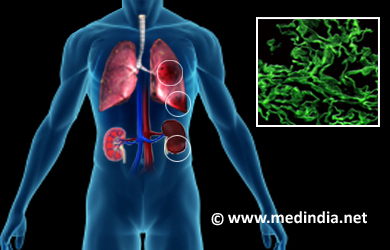- Laura Bergs. Goodpasture Syndrome. Crit Care Nurse 2005;25:50-58
About
In
Goodpasture syndrome is an autoimmune condition that affects the kidneys and the lungs. In a normal person, antibodies are produced to fight against anything foreign like an infection. In an autoimmune disease, the body produces antibodies that fail to recognize parts of the body, mistake them to be ‘foreign’ and launch an attack against them.

Goodpasture syndrome is a rare condition affecting 1 in 1 million people each year. It is also known as anti-glomerular basement membrane disease (Anti-GBM disease), rapidly progressive glomerulonephritis with pulmonary hemorrhage, or pulmonary renal syndrome.
People at increased risk for suffering from Goodpasture syndrome include:
- White individuals
- Males, more than females
- People in their mid 30s or late 50s
- People with genetic predisposition; Goodpasture syndrome has been linked to HLA-DRB1*1501 region of the genes
- People with a history of smoking or exposure to hydrocarbons like trichloroethane, carbon tetrachloride, xylene, and ethyl ether. These individuals are particularly susceptible to the lung complications of Goodpasture syndrome due to prior damage to the lung sacs.
- People with viral respiratory infections like influenza.
The basement membrane is a tissue on which the cells rest. In the kidneys, the basement membrane lines the filtering units called the glomeruli. Here, it plays an important role in preventing filtration of large particles like proteins and red blood cells into the urine. In the lungs, the basement membrane lines the air sacs.
In Goodpasture syndrome, antibodies are formed that attack the collagen tissue on the basement membrane in the kidneys and the lungs. These antibodies are called anti-GBM antibodies.
The damage inflicted by anti-GBM antibodies to the basement membrane lining of the air sacs in the lungs results in bleeding into the alveoli. This could further lead to respiratory failure and severe blood loss.
Similar damage to the basement membrane in the glomeruli of the kidneys results in loss of protein and blood in the urine. The white blood cells form crescent shaped structures in the glomeruli, leading to a condition called glomerulonephritis. This could be followed by kidney failure in severe cases.
Symptoms in Goodpasture syndrome depend on which organ is affected. Diagnosis depends on demonstration of anti-GBM antibodies in the blood of patients. In some cases, a kidney biopsy may be required.
The aim of









